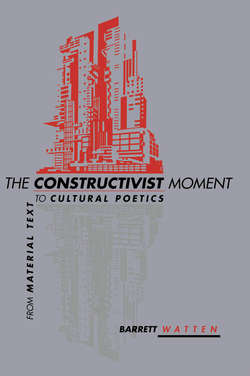Читать книгу The Constructivist Moment - Barrett Watten - Страница 13
На сайте Литреса книга снята с продажи.
NEW MEANING
ОглавлениеMoving from a concept of poetic diction to one of poetic vocabulary involves a shift as well to a historicist and context-specific notion of the opacity of poetic language. In the discussion of the examples of poetic praxis above, there is an evident progression from Coleridge’s notion of poetic form as conserved by community (the clerisy) to Mac Low’s poetics of community self-enactment as the completion of poetic form. Both forms of poetic praxis are rule governed, Coleridge’s in the “severer keeping” of poetic form and Mac Low’s in the literal conditions given by the author for the performance of his works. However, it would be unhistorical to suggest a merely formal inversion as accounting for the difference but also congruence between romantic and postmodern poetic praxes. Between these moments lies the contested terrain of modernism, seen in the different models for the relations between language, community, and poetic form in Ogden and Richards’s BASIC English and in Zukofsky’s response to and interpretation of it. Ogden and Richards generalize the community of Coleridge’s clerisy as the men of research who are suitable interpreters of meaning, likewise generalizing the regulative ideals of Coleridge’s organic form as the necessary conditions for communication. Poetic diction is crucial, then, to the imperial project of fitting vocabulary to meaning in a universal language. Zukofsky’s contestation of and fascination with BASIC is a cultural intervention into the construction of English as a universal language seen in relation to that which it excludes, a Tower of Babel of many languages that includes Zukofsky’s original Yiddish. At the same time, Zukofsky’s modernist commitments paradoxically require similar values of condensation and lexical substitution as those of BASIC English. What results is the new meaning of Zukofsky’s opaque style, a modernist interpretation of Coleridge’s analysis of ideological investments in the habitual judgments of poetry that the tradition founded on his work has done so much to institutionally preserve. Mac Low continues this project of ideological critique, motivated in Zukofsky by the differences between communities of speakers, as the basis for a poetic experiment in the enactment of polity. Nonintentional composition does not simply free language from reference and create the illusion of a nonhistorical subject who is free to make meaning; rather, Mac Low’s methods are historically produced and invoke contextual reenactment as a model for interpretation. If this thought experiment shows a way out of the expressivist confines of organic form (and it does), we may find a new meaning in radical experiments in language.
